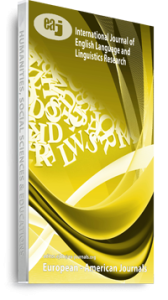Citation: Khaloufah Al-Shehri (2022) The Impact of Native English Instruction on the Saudi EFL Students’ Proficiency: Appraisal Study, International Journal of English Language and Linguistics Research, Vol.10, No 1, pp.1-21
The issue of including nativeness in teaching English has been controversial in arguments by the stakeholders in the EFL context. Native English-speaking teacher (NEST) is perceived to be an ideal linguistic model where EFL students can achieve the target-like competence. This paper reports the outcome of a study carried out in Jeddah’s intensive English program with 46 Saudi male students to see whether NESTs have any effect on the students’ linguistic achievement in CEPT test. The study is a quantitative -based that adopts pretest-posttest design in data collection. The data are statistically scrutinized by using SPSS. The major findings reveal that NESTs have significant impact on the Saudi EFL students’ achievement. However, the nationality variable (being British or South African teacher) has no significant difference on the students. This study shows that low level students benefit more from native English instruction than upper intermediate. Besides the teacher’s nativeness, there are several factors that could significantly influence native English instruction such as the quality of NESTs, students’ quality and motivation, taught curriculum and class size. Based on the findings, this study recommends that variables such as qualification and experiences should be considered along with nativeness in staffing EFL programs. NESTs should not be hired according to their nativeness or nationality only.
Keywords: NEST; EFL; language proficiency; students’ achievement

